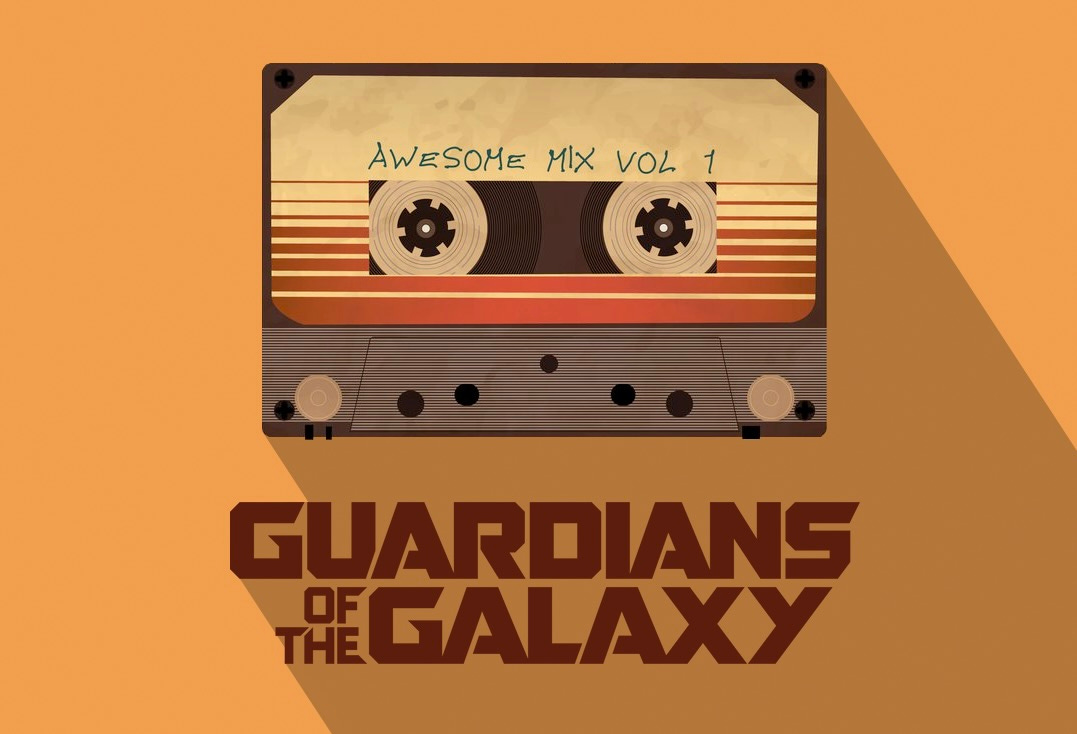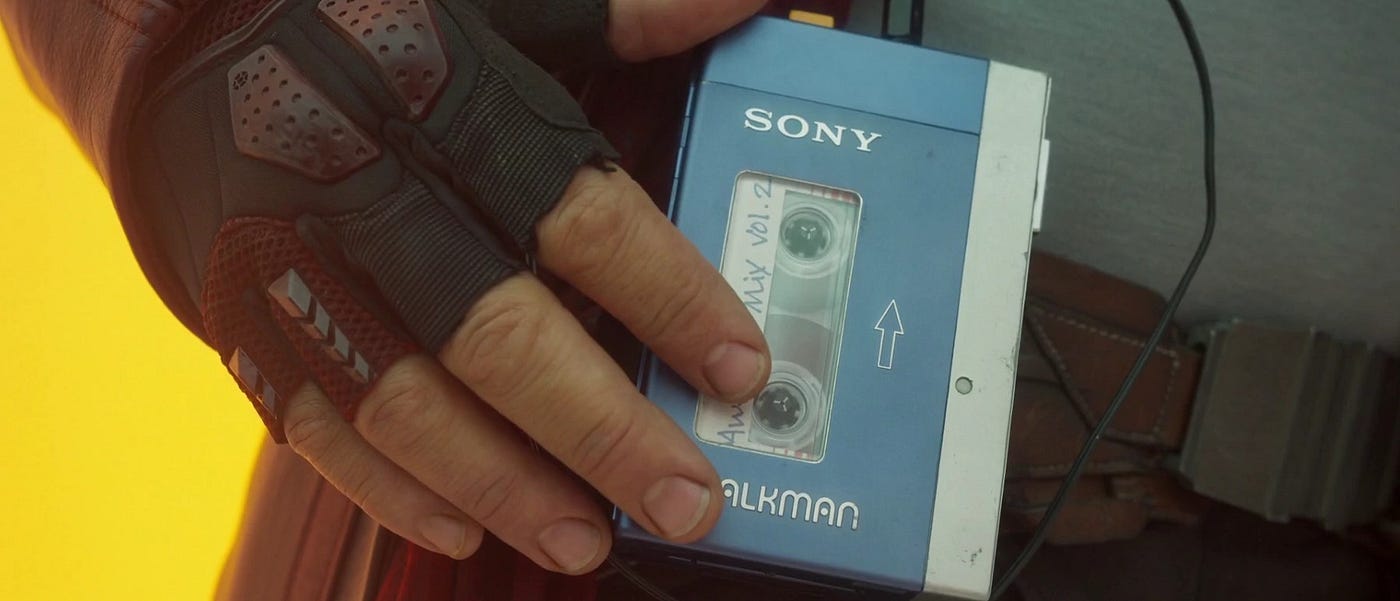Music, Arrested Development, and the 'Guardians of the Galaxy'
How writer-director James Gunn uses music to explore childhood trauma and the perils of fetishizing nostalgia in his Marvel trilogy
SPIDER-MAN: HOMECOMING hit screens in 2017, ostensibly launching the Marvel Cinematic Universe’s first franchise built around “coming of age” as a superhero…but the reality is, Marvel had already done that when it unleashed GUARDIANS OF THE GALAXY in 2014.
The space-based GUARDIANS trilogy has been, from the start, a counterintuitively intimate story about children trapped in adult bodies, crippled by arrested development, almost all of them struggling with (typically lethal) parent issues. Consider the hilarious bickering, the emotional dysregulation, the obsessive fixations.
But what I find most interesting about all this is how writer-director James Gunn has used these three films to explore the dangerous allure of nostalgia — the fetishization of our childhoods — and the painful journey to evolve beyond all that baggage.
And music is the key to that.
If you’ve seen the GUARDIANS OF THE GALAXY films, you don’t need me to tell you about the parental issues I just touched on, especially the daddy issues that pervade, but I’m going to anyway.
Peter Quill/Star-Lord and Mantis call the murderous planet Ego their father; Peter was also the adopted son of a violent Ravager who kidnapped him from his Earth mother; Gamora and Nebula are the adopted children of Thanos the Mad Titan, a genocidal maniac who tortured and maimed one and ultimately killed the other; and Rocket Racoon’s “father” is similarly a genocidal crackpot named the High Evolutionary.
Basically, childhood trauma is a prerequisite for joining the Guardians.
In almost every case, the Guardians are incapable of moving on without trying to kill or successfully killing one of their parents. It’s all very Greek. But that emotional progress isn’t easy, and for almost all of them first involves trying to hold on to that childhood trauma in some way or another. After all, pain sometimes becomes so familiar, so wrapped up in our identities, the idea of living without it is too much to bear.
In Peter’s case, his commitment to his trauma is so extreme that he cannot let go of the pop culture that defined his brief, happy childhood on Earth — the seventies and eighties music he brought with him when kidnapped and his numerous (always erroneous) references to iconic eighties films and their stars. The cinematic nail is hit pretty damn hard on the head in THE GUARDIANS OF THE GALAXY HOLIDAY SPECIAL (2022), in which Peter’s friends try to kidnap Kevin Bacon, the star of his favorite film FOOTLOOSE (1984), to help him get in the Christmas spirit.
But let’s focus on the music, bringing this conversation into a little more focus. In the GUARDIANS trilogy, music is, I would argue, a metaphor for Peter’s — and, by extension, the Guardians’ — emotional growth from adult-sized children to complete adults.
GUARDIANS OF THE GALAXY
A soundtrack comprised of boisterous sixties and seventies hits that were, we’re told, some of Peter Quill’s mother’s favorite songs. They also all precede the presumed birth of Peter on Earth, as actor Chris Pratt was born at the close of the seventies.
Nostalgic songs such as Blue Swede’s “Hooked on a Feeling”, the Runaway’s “Cherry Bomb”, and David Bowie’s “Moonage Daydream” provide an immediate way for Earth-bound audiences to connect to the extraordinary, often incredibly odd events taking place on our screens. Music, of course, being deeply connected to dance, this is also a fun way for Gunn to make Peter dance in the style of Michael Jackson and his hero Kevin Bacon.
(Metatextually, this soundtrack is also deeply rooted in Gunn’s own childhood given the fact that he was born in the sixties and grew up in the seventies).
GUARDIANS OF THE GALAXY VOL. 2
More of the same era here, which makes sense given the fact that Peter must confront his biological father in this film, a being who seduced Peter’s mother to the same soundtrack that accompanies Peter everywhere. These songs are Peter’s past in every way. They are who he thinks he is…which is still very much a child.
Incidentally, VOL. 2 ends with the greatest cinematic use of Cat Stevens’s “Father and Son” ever, as far as I’m concerned - a sequence I still get misty about if I dwell on too long. That’s probably because I have dead daddy issues, too, but let’s not get into that today.
Anyways…Peter is finally given a Microsoft Zune in the film, replacing his beloved Walkman and providing him with a more expansive musical catalog to entertain himself with. This is where things get really interesting.
GUARDIANS OF THE GALAXY VOL. 3
The latest — and allegedly final — GUARDIANS film opens with an acoustic version of Radiohead’s “Creep”. “Creep” was released in 1992, and is one of the many songs on Peter’s Zune - songs from the eighties, nineties, and new millennia. By virtue of this Zune, Peter has been provided new emotional language to understand what is happening to him. In other words, he’s “growing up” through this music (and, along with him, his friends).
One of the film’s most poignant scenes sees Peter staring out at space, his friend dying behind him, as the Flaming Lips’ “Do You Realize??” plays. A unique aspect of VOL. 3 is how such songs narrate our characters’ existential struggles. They become windows to emotions too big and complicated for any of them to ever even try expressing themselves.
VOL. 3 ultimately ends with Florence + the Machine’s dance track “Dog Days of Summer”, which dropped in 2008 but was re-released in 2010 to much more spectacular results. It’s one of three songs on the soundtrack released in the teens, the other two being the Mowgli’s “San Francisco” (2012) and “Koinu no Carnival” (2016) - though “Koinu no Carnival” is from an anime and less specific to Peter’s emotional journey.
The point is, “Dog Days of Summer”, a triumphant song released at roughly the same time that Gunn began to work on the original “GUARDIANS OF THE GALAXY” actually concludes the film…completing Peter’s journey from man-child with his foot caught in a nostalgia trap to complete adult as he should have been when this trilogy first kicked off. The Guardians’ journey is to come full circle in a manner. Specifically, to confront their pasts as a means to finding their way back to the beings they should’ve been when we first met them back in 2014.
I find it really hard to argue that the GUARDIANS trilogy’s use of music isn’t one of the most impressive storytelling elements of the films. It’s a masterful demonstration of how soundtracks can provide characters just as much “growth” as a screenplay might.
If this article added anything to your life but you’re not up for a paid subscription, please consider buying me a “coffee” so I can keep as much of this newsletter free as possible for the dreamers who couldn’t afford it otherwise.
PSALMS FOR THE END OF THE WORLD is out now from Headline Books, Hachette Australia, and more. You can order it here wherever you are in the world:







I always appreciated the soundtracks to those films, but this certainly made me appreciate them more!